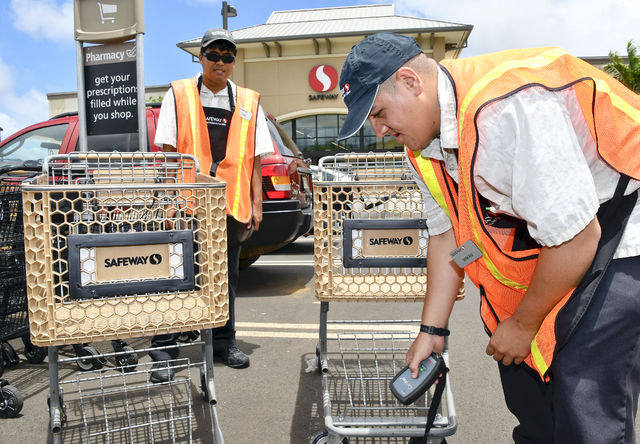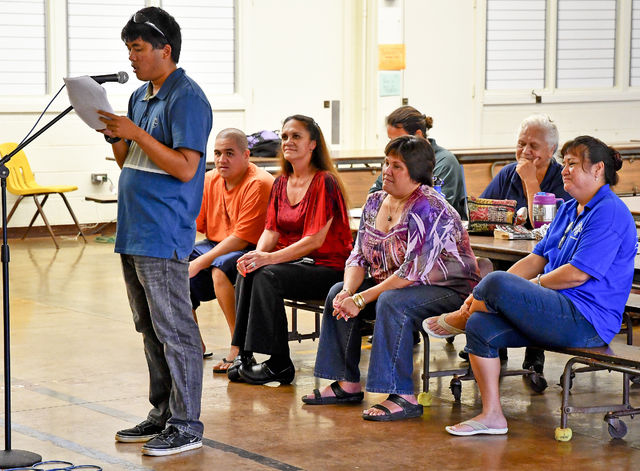LIHUE — Chad Okino and Makani Kapua are some of the Lihue Safeway’s star employees. Both young men are courtesy clerks in the grocery store. And both have been through Hoomana’s Hana Kalima program (which means “Working Hands”), where they
LIHUE — Chad Okino and Makani Kapua are some of the Lihue Safeway’s star employees.
Both young men are courtesy clerks in the grocery store. And both have been through Hoomana’s Hana Kalima program (which means “Working Hands”), where they were trained to enter the workforce, and through the Ao Oihana program, or the job coaching program. Now they are holding down their first-ever jobs with enthusiasm.
“In April 2016, I was officially hired and given the courtesy clerk position,” Okino announced in an update at the Office of Hawaiian Affairs (OHA) board meeting. “I love working with Hoomana because of the support I get from Auntie Row and Auntie Anela.”
Rowena Pangan and Anela Pa are with Hoomana Inc., a nonprofit organization that provides basic development and employment skills to youth and adults with special needs.
The organization’s primary focus is using its thrift store in Wailua as a training site for individuals, where they learn skills in the Hana Kalima Program that are transferred to their careers later on.
“Working with Hoomana gave me the opportunity to learn various job skills such as sweeping, dusting, mopping and organizing, and I was able to continue those skills at home under the guidance of my mom,” Okino told OHA trustees at the Wednesday meeting in Lihue.
Okino, who was diagnosed with autism at a young age, started job training with Hoomana while he was finishing up his education at Kauai High School.
“I turned 22 years old this year and I was finally done” with high school,” Okino said. “So I was given this opportunity to apply for a job in the Lihue Safeway.”
Pangan said Okino, and all of the individuals who transition into the job market after completing the Hana Kalima program at Hoomana, begin to collect a paycheck immediately as they work through the Ao Oihana program
“They’re not living off the system,” she said. “From the get-go, they get a paycheck.”
The young men collect their paychecks every Thursday at the customer service department in the store, then visit the Bank of Hawaii’s in-store location for banking.
“We’ve learned how to write a check (and) save money, so I have half of it put into my savings and half to GameStop,” Okino said.
Pangan explained that both young men commute to work via the paratransit bus system. She’s available if they need any advice, even though they’ve technically graduated out of the Ao Oihana program and are now on their own.
In fact, they’re two of four people who have successfully gone through the Hana Kalima and Ao Oihana programs at Hoomana and are working at Safeway. Hoomana also has had clients placed in the Kilauea Menehune Food Mart and Deja Vu surf shop.
“In our Hana Kalima Program, Hoomana has trained participants — including Chad and Makani — in real life and job transferable skills in hopes they become independent, contributing members of our community,” Pa said.
The focus of the organization is mainly on students from Kapaa and Kauai high schools, who visit the thrift store during the school day for about two hours, she explained. Students arrive on school buses, which sometimes presents a challenge for attendance.
“Being (there is) the teacher shortage here on the island, we’re having problems having a body accompanying them on the school bus to our facility and to watch over them as we teach them,” Pa said.
The Department of Education ages students out of high school at 22 years old and Pa said they found “the higher functioning clients were left at home, some actually regressing, because there weren’t very many resources out there for them.”
That’s what sparked the idea for the Ao Oihana program, for which Pangan is the primary job coach.
“Rowena is a great job coach — we call her the drill sergeant,” Pa said.
Hoomana’s newest Hana Kalima program session begins Aug. 22 and Pa said they are expecting around 20 students.
Hoomana was established in 2003 in a Wailua building that had been vacant since Hurricane Iniki hit in 1992. The lease on the property indicates the building is to be used for rehabilitative purposes.
“Old-timers would remember the Rehab Unlimited Kauai (RUK), which served special needs adults,” Pa said.
The building was turned into the Hoomana Thrift Store after the two women collaborated with OHA and obtained the nonprofit status for the organization.
“The idea was to use it as a training site for these special needs students who we found were just sitting around on the mall or at home,” Pa said. “Both Rowena and myself are parents — and now grandparents — of special needs children, and knew the frustration and issues that these young adults would be facing once they left school.”
Now, 13 years later, Hoomana has expanded to include clients in social agencies who need to complete a certain number of volunteer hours in order to receive their benefits, such as financial, food stamps, housing and medical.
“Clients work their hours, learn job skills while Hoomana’s operational facet is solidified so Rowena and myself can implement programs,” Pa said.
Pangan said right now she’s focusing on efforts to expand the Ao Oihana program. Her goal is to place people in hotels and other industries on the island. But she encounters resistance when she approaches many businesses.
“I think people with disabilities get pushed away because it’s unknown and a lot of times people just have that natural ignorance,” Pangan said. “There’s a stigma toward what they carry, but given the right opportunity they do awesome.”



